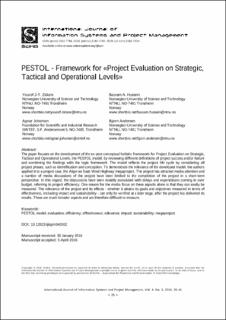| dc.contributor.author | Zidane, Youcef | |
| dc.contributor.author | Johansen, Agnar | |
| dc.contributor.author | Hussein, Bassam A. | |
| dc.contributor.author | Andersen, Bjørn Sørskot | |
| dc.date.accessioned | 2020-06-09T09:45:08Z | |
| dc.date.available | 2020-06-09T09:45:08Z | |
| dc.date.created | 2016-09-29T22:12:45Z | |
| dc.date.issued | 2016 | |
| dc.identifier.citation | International Journal of Information Systems and Project Management. 2016, 4 (3), 25-41. | en_US |
| dc.identifier.issn | 2182-7796 | |
| dc.identifier.uri | https://hdl.handle.net/11250/2657327 | |
| dc.description.abstract | The paper focuses on the development of the ex-post conceptual holistic framework for Project Evaluation on Strategic, Tactical and Operational Levels, the PESTOL model, by reviewing different definitions of project success and/or failure and combining the findings with the logic framework. The model reflects the project life cycle by considering all project phases, such as identification and conception. To demonstrate the relevance of the developed model, the authors applied it to a project case, the Algerian East–West Highway megaproject. The project has attracted media attention and a number of media discussions of the project have been limited to the completion of the project in a short-term perspective. In this regard, the discussions have been notably associated with delays and expenditures coming in over budget, referring to project efficiency. One reason for the media focus on these aspects alone is that they can easily be measured. The relevance of the project and its effects - whether it attains its goals and objectives measured in terms of effectiveness, including impact and sustainability - can only be verified at a later stage, after the project has delivered its results. These are much broader aspects and are therefore difficult to measure. | en_US |
| dc.language.iso | eng | en_US |
| dc.publisher | SciKA | en_US |
| dc.rights | Attribution-NonCommercial-NoDerivatives 4.0 Internasjonal | * |
| dc.rights.uri | http://creativecommons.org/licenses/by-nc-nd/4.0/deed.no | * |
| dc.title | PESTOL - Framework for «Project Evaluation on Strategic, Tactical and Operational Levels» | en_US |
| dc.type | Peer reviewed | en_US |
| dc.type | Journal article | en_US |
| dc.description.version | publishedVersion | en_US |
| dc.source.pagenumber | 25-41 | en_US |
| dc.source.volume | 4 | en_US |
| dc.source.journal | International Journal of Information Systems and Project Management | en_US |
| dc.source.issue | 3 | en_US |
| dc.identifier.doi | 10.12821/ijispm040302 | |
| dc.identifier.cristin | 1387866 | |
| dc.description.localcode | Copyright © 2016,SciK A. General permission to republish in print or electronic forms, but not for profit, all or part of this material is granted, provided that the International Journal of Information Systems and Project Management copyright notice is given and that reference made to the publication, to it s date of issue, and to the fact that reprinting privileges were granted by permission of SciKA-Association for Promotion and Dissemination of Scientific Knowledge | en_US |
| cristin.ispublished | true | |
| cristin.fulltext | original | |
| cristin.qualitycode | 1 | |

